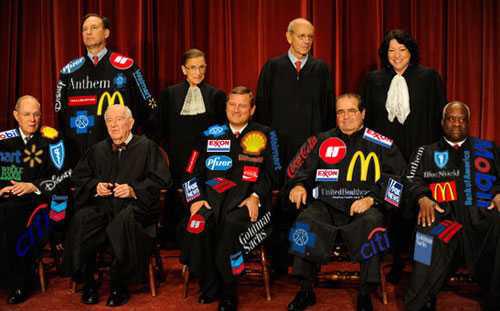When I wrote the other day about a lack of wisdom, I wasn’t prepared for an even more stunning thesis: that ideology would trump both common sense and wisdom.
I had taken for granted that common sense was often used to support the governing ideology.
In the Supreme Court’s 5-4 decision to uphold the already controversial 5-4 decision of Citizens United, the Roberts Court displayed neither wisdom nor common sense in a brazen defense of ideology that shows little respect for the purpose of the Law.
The essential groundwork of the issue is found in how the framers of the constitution understood the form of government they were developing. They understood that democracy cannot exist without liberty.
In this way, liberty means much more than personal sovereignty, but the protection of the minority from the rule of the majority. In this way, the very basis of democracy necessitates liberty. Democracy is tyranny without a liberty that generates equality. This was the basis for all of those arguments about taxation and voting with which we are very familiar.
The rallying cry “one person, one vote” is one of equalizing individuals and does not treat as equal one person and one organization. The First Amendment to the Constitution of the United States was written to specifically describe equality among people.
For in the very defense of Citizens United, the conservatives see the organization as both an individual unto itself and a collection of individuals, granting a sort of dual citizenship that twists basic logic into an unmitigated mess. It also rejects the founding principles the conservatives purport to defend so vigorously.
This disaster is the culminating sequence of events that sought to resolve what many have long mistaken for an oversight: that the First Amendment was not written for individuals alone but was intended to include corporations.
Except that it wasn’t; for corporations were despised by the founders for what they were capable of doing to destroy democracy. They were seen as the villainous corrupter of democracy, and the source of compromising both the authority of the government and the liberty of the people.
Those early leaders were familiar with the dangers posed by large, unregulated corporations after the East India Company operated outside of British law for years. They were excluded from the First Amendment on purpose because they were not intended to have the rights of individuals.
Returning to the case itself, this was, by all credible defenders of the law, a slam dunk refutation of the Citizens United case, as the state of Montana had written laws to defend against the very corrupting influences the conservative majority argued were not present in the original Citizens United case.
They had examples of corporations buying elections and the example of how democracy flourished without the moneyed interests, as the state operated much cleaner, substantive elections than anywhere else in the country.
In Montana, campaigns required only a few thousand dollars to run, rather than multiple millions. Campaigns could be run by individuals based on the issues rather by party apparatuses set up to maintain the control of both their party and their benefactors. It was both the negative and positive refutation of the Citizens United experiment.
In choosing to not even hear oral arguments, The Roberts Court demonstrated how highly they placed their ideology over the very substance of the case, and demonstrated neither sense or wisdom in blindly supporting their previous decision. They could not be bothered with reasoning through the case or hearing a verbal attack on the lynchpin of the defending case.
This was their chance for a “redo” and save face in the original case.
The Citizens United decision, already widely criticized by legal scholars of all stripes, was as naked and appalling a use of authority the Court has used since Bush v. Gore. But in many ways, was actually worse.
In Bush v. Gore, they hid the changing results of a single, close election. In this and its previous case, the Roberts Court is undermining our very democracy by decimating the true understanding of liberty: that all people are equal, and the minority must be protected from the tyranny of the majority.
Today’s tyranny isn’t just abuse under the law, but abuse of our minds through substanceless campaign ads. Now, as ever, corporations and people are unequal.
In choosing to defend their ideology rather than deal with the substance of the law they have sworn to defend, the Roberts Court have irrevocably undermined their authority and forever compromised the American experiment.
Now, the coming ruling in the Affordable Care Act case is much less likely to hurt them, since this case has already severely compromised their authority.
Perhaps that is why they ruled on this first.

Leave a Reply